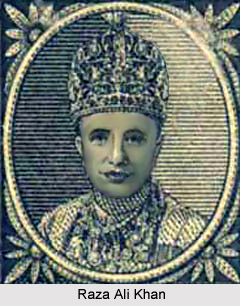 Raza Ali Khan, popularly known as Nawab Raza Ali Khan Bahadur, was one of the most eminent rulers or Nawabs of the princely state of Rampur. The princely state was later incorporated into the Indian state of Uttar Pradesh in the year 1949. He was born on 17 November 1908 and succeeded his father Nawab Sayyid Hamid Ali Khan Bahadur and ascended the throne after his father`s death on 20th June 1930. He belonged to the Rohilla Dynasty. Raza Ali Khan Bahadur ruled over the territory of Rampur from the year 1930 to 1966.
Raza Ali Khan, popularly known as Nawab Raza Ali Khan Bahadur, was one of the most eminent rulers or Nawabs of the princely state of Rampur. The princely state was later incorporated into the Indian state of Uttar Pradesh in the year 1949. He was born on 17 November 1908 and succeeded his father Nawab Sayyid Hamid Ali Khan Bahadur and ascended the throne after his father`s death on 20th June 1930. He belonged to the Rohilla Dynasty. Raza Ali Khan Bahadur ruled over the territory of Rampur from the year 1930 to 1966.
Rule of Raza Ali Khan
Nawab Raza Ali Khan of Rampur was a progressive and tolerant ruler. He took adequate care for the betterment of his subjects and increased the number of Hindu populace in the region of Rampur. Moreover, he developed the irrigation system, successfully undertook and completed projects for electrification, established new schools and educational institutes, constructed and developed the roads and sewage systems etc. The much respected Nawab of the princely state of Rampur sent his skilled army to battle in the Middle East during the World War II.
After the Independence of India on 15th August 1947, Nawab Raza Ali Khan Bahadur agreed to the Dominion of India and Rampur was officially merged with India in the year 1949. The region became part of the newly formed state of Uttar Pradesh in the year 1950. Later Sir Raza Ali Khan concentrated on various charitable projects. He was also the head of the Free Masons in India as the first Grand Master of the Grand Lodge of India.
Personal Life of Raza Ali Khan
Nawab Raza Ali Khan of Rampur died at the age of 57 on 6th March 1966 and was buried at Karbala. He was succeeded by Murtaza Ali Khan Bahadur, who was his eldest son.
Titles of Raza Ali Khan
Hamid Ali Khan, Nawab of the princely state of Rampur held many titles through out his reign. These are discussed below-
* Nawabzada Muhammad Raza Ali Khan, Wali Ahad Bahadur (1908- 1930)
* His Highness Ali Jah, Farzand-i-Dilpazir-i- Daulat-i-Inglishia, Mukhlis ud-Daula, Nasir ul-Mulk, Amir ul-Umara, Nawab Sayyid Muhammad Raza Ali Khan Bahadur, Mustaid Jang, Nawab of Rampur (1930- 1931)
* Lieutenant His Highness Ali Jah, Farzand-i-Dilpazir-i- Daulat-i-Inglishia, Mukhlis ud-Daula, Nasir ul-Mulk, Amir ul-Umara, Nawab Sayyid Muhammad Raza Ali Khan Bahadur, Mustaid Jang, Nawab of Rampur (1931- 1934)
* Captain His Highness Ali Jah, Farzand-i-Dilpazir-i- Daulat-i-Inglishia, Mukhlis ud-Daula, Nasir ul-Mulk, Amir ul-Umara, Nawab Sayyid Muhammad Raza Ali Khan Bahadur, Mustaid Jang, Nawab of Rampur (1934- 1936)
* Captain His Highness Ali Jah, Farzand-i-Dilpazir-i- Daulat-i-Inglishia, Mukhlis ud-Daula, Nasir ul-Mulk, Amir ul-Umara, Nawab Sayyid Sir Muhammad Raza Ali Khan Bahadur, Mustaid Jang, Nawab of Rampur, KCSI (1936- 1940)
* Major His Highness Ali Jah, Farzand-i-Dilpazir-i- Daulat-i-Inglishia, Mukhlis ud-Daula, Nasir ul-Mulk, Amir ul-Umara, Nawab Sayyid Sir Muhammad Raza Ali Khan Bahadur, Mustaid Jang, Nawab of Rampur, KCSI (1940- 1944)
* Lieutenant-Colonel His Highness Ali Jah, Farzand-i-Dilpazir-i- Daulat-i-Inglishia, Mukhlis ud-Daula, Nasir ul-Mulk, Amir ul-Umara, Nawab Sayyid Sir Muhammad Raza Ali Khan Bahadur, Mustaid Jang, Nawab of Rampur, GCIE, KCSI (1944- 1946)
* Major-General His Highness Ali Jah, Farzand-i-Dilpazir-i- Daulat-i-Inglishia, Mukhlis ud-Daula, Nasir ul-Mulk, Amir ul-Umara, Nawab Sayyid Sir Muhammad Raza Ali Khan Bahadur, Mustaid Jang, Nawab of Rampur, GCIE, KCSI (1946- 1961)
* Major-General His Highness Ali Jah, Farzand-i-Dilpazir-i- Daulat-i-Inglishia, Mukhlis ud-Daula, Nasir ul-Mulk, Amir ul-Umara, Nawab Sayyid Sir Muhammad Raza Ali Khan Bahadur, Mustaid Jang, Nawab of Rampur, GCIE, KCSI, Most Worshipful the Grand Master of the Grand Lodge of Antient, Free & Accepted Masons of India (1961- 1966)
Honours of Raza Ali Khan
Raza Ali Khan Bahadur was honoured a number of times, these are as follows-
* Nishan-i-Hamidia, 1st Class of Rampur
* Nishan-i-Iqbal, 1st Class of Rampur
* King George V Silver Jubilee Medal (1935)
* Knight Commander of the Order of the Star of India- KCSI (1936)
* King George VI Coronation Medal (1937)
* Knight Grand Commander of the Order of the Indian Empire- GCIE (1944)
* Indian Independence Medal (1947)
* Queen Elizabeth II Coronation Medal (1953)






































